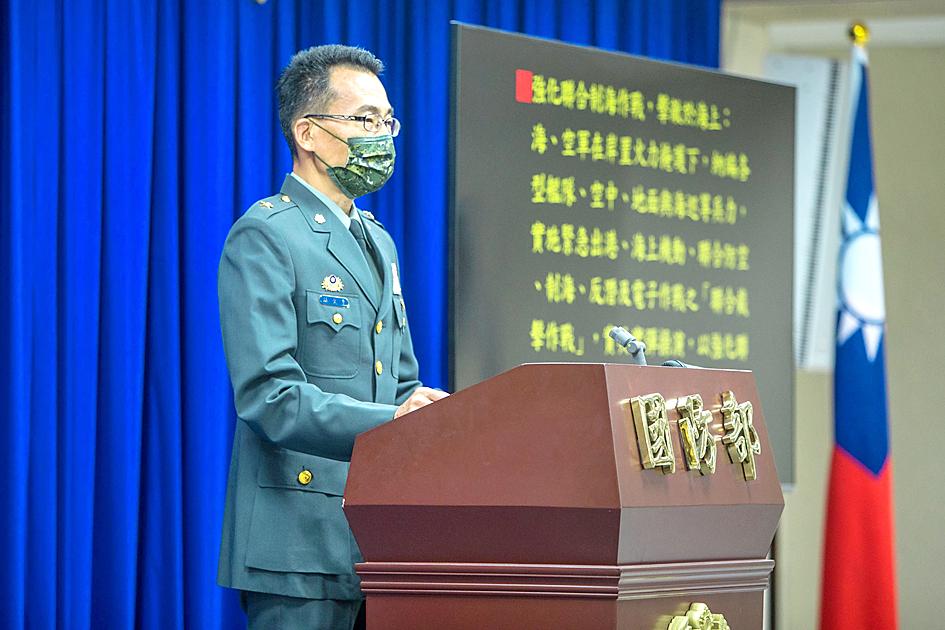The annual Han Kuang military exercises are to begin today with tabletop wargames to test defense strategies against possible Chinese invasion scenarios, the Ministry of National Defense said yesterday.
Unlike previous editions, this year’s wargames would not feature computer simulations and would instead involve physical maps, the ministry said.
The computerized format was dropped because physical maps allow generals to meet face-to-face to discuss strategy and brainstorm ides, a military source said.

Photo courtesy of the Ministry of National Defense
In this way, top-level military officials can better come up with an understanding and reach consensus on defensive strategies, which would be beneficial to the planning of overall military operations, the source said.
Furthermore, unlike computerized wargames, which involve large numbers of personnel from military branches, tabletop wargames only feature a small number of senior military personnel and their staff, the source said, adding that it is a better option given a local COVID-19 outbreak.
The wargames are to run until Friday. They comprise the first phase of the two-part exercise that is held in two stages, the latter being live-fire drills, which are to be held from July 25 to 29 at military drill grounds nationwide.
The annual exercises, first held in 1984, are the nation’s largest military exercises involving all branches of the armed forces and designed to test the country’s combat readiness in the event of a Chinese invasion.
This year’s edition would also incorporate lessons from Russia’s invasion of Ukraine to sharpen combat readiness against a Chinese invasion, the ministry has said.
They are to focus on testing the military’s asymmetrical warfare capability, its ability to wage cognitive warfare and mobilize reserve forces, as well as its overall defense readiness by incorporating civilians, said Major General Lin Wen-huang (林文皇), who is in charge of combat and planning affairs at the ministry.

Taiwan has received more than US$70 million in royalties as of the end of last year from developing the F-16V jet as countries worldwide purchase or upgrade to this popular model, government and military officials said on Saturday. Taiwan funded the development of the F-16V jet and ended up the sole investor as other countries withdrew from the program. Now the F-16V is increasingly popular and countries must pay Taiwan a percentage in royalties when they purchase new F-16V aircraft or upgrade older F-16 models. The next five years are expected to be the peak for these royalties, with Taiwan potentially earning

STAY IN YOUR LANE: As the US and Israel attack Iran, the ministry has warned China not to overstep by including Taiwanese citizens in its evacuation orders The Ministry of Foreign Affairs (MOFA) yesterday rebuked a statement by China’s embassy in Israel that it would evacuate Taiwanese holders of Chinese travel documents from Israel amid the latter’s escalating conflict with Iran. Tensions have risen across the Middle East in the wake of US and Israeli airstrikes on Iran beginning Saturday. China subsequently issued an evacuation notice for its citizens. In a news release, the Chinese embassy in Israel said holders of “Taiwan compatriot permits (台胞證)” issued to Taiwanese nationals by Chinese authorities for travel to China — could register for evacuation to Egypt. In Taipei, the ministry yesterday said Taiwan

‘LIKE-MINDED PARTNER’: Tako van Popta said it would be inappropriate to delay signing the deal with Taiwan because of China, adding he would promote the issue Canadian senators have stressed Taiwan’s importance for international trade and expressed enthusiasm for ensuring the Taiwan-Canada trade cooperation framework agreement is implemented this year. Representative to Canada Harry Tseng (曾厚仁) in an interview with the Central News Agency (CNA) said he was increasingly uneasy about Ottawa’s delays in signing the agreement, especially as Ottawa has warmed toward Beijing. There are “no negotiations left. Not only [is it] initialed, we have three versions of the text ready: English, French and Mandarin,” Tseng said. “That tells you how close we are to the final signature.” Tseng said that he hoped Canadian Prime Minister Mark Carney

POSITIVE DEVELOPMENT: Japan and the US are expected to hold in-depth discussions on Taiwan-related issues during the meeting next month, Japanese sources said The holding of a Japan-US leaders’ meeting ahead of US President Donald Trump’s visit to China is positive news for Taiwan, former Japan-Taiwan Exchange Association representative Hiroyasu Izumi said yesterday. After the Liberal Democratic Party’s landslide victory in Japan’s House of Representatives election, Japanese Prime Minister Sanae Takaichi is scheduled to visit the US next month, where she is to meet with Trump ahead of the US president’s planned visit to China from March 31 to April 2 for a meeting with Chinese President Xi Jinping (習近平). Japan and the US are expected to hold in-depth discussions on Taiwan-related issues during the